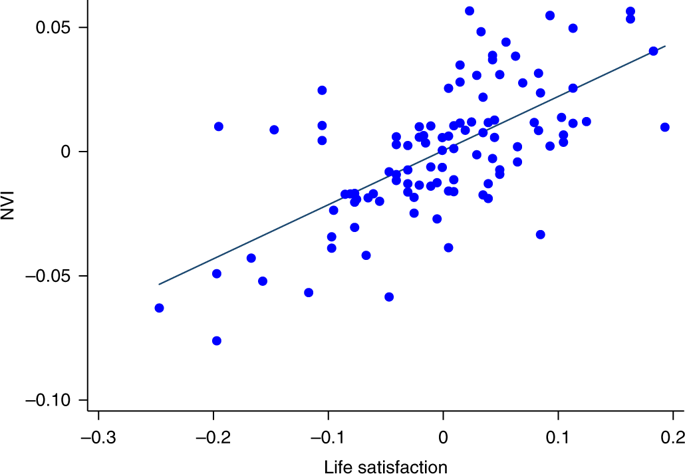当前位置:
X-MOL 学术
›
Nat. Hum. Behav.
›
论文详情
Our official English website, www.x-mol.net, welcomes your
feedback! (Note: you will need to create a separate account there.)
Historical analysis of national subjective wellbeing using millions of digitized books.
Nature Human Behaviour ( IF 21.4 ) Pub Date : 2019-10-14 , DOI: 10.1038/s41562-019-0750-z Thomas T Hills 1, 2 , Eugenio Proto 3, 4, 5 , Daniel Sgroi 3, 6 , Chanuki Illushka Seresinhe 2
Nature Human Behaviour ( IF 21.4 ) Pub Date : 2019-10-14 , DOI: 10.1038/s41562-019-0750-z Thomas T Hills 1, 2 , Eugenio Proto 3, 4, 5 , Daniel Sgroi 3, 6 , Chanuki Illushka Seresinhe 2
Affiliation

|
In addition to improving quality of life, higher subjective wellbeing leads to fewer health problems and higher productivity, making subjective wellbeing a focal issue among researchers and governments. However, it is difficult to estimate how happy people were during previous centuries. Here we show that a method based on the quantitative analysis of natural language published over the past 200 years captures reliable patterns in historical subjective wellbeing. Using sentiment analysis on the basis of psychological valence norms, we compute a national valence index for the United Kingdom, the United States, Germany and Italy, indicating relative happiness in response to national and international wars and in comparison to historical trends in longevity and gross domestic product. We validate our method using Eurobarometer survey data from the 1970s and demonstrate robustness using words with stable historical meanings, diverse corpora (newspapers, magazines and books) and additional word norms. By providing a window on quantitative historical psychology, this approach could inform policy and economic history.
中文翻译:

使用数百万本数字化书籍对国家主观幸福感的历史分析。
除了改善生活质量以外,更高的主观幸福感还导致更少的健康问题和更高的生产率,这使主观幸福感成为研究人员和政府的关注重点。但是,很难估计人们在过去几个世纪中的幸福程度。在这里,我们展示了一种基于对过去200年中发布的自然语言进行定量分析的方法,可以捕获历史主观幸福感方面的可靠模式。使用基于心理价态规范的情感分析,我们计算出英国,美国,德国和意大利的国家价态指数,表明响应国家和国际战争以及相对于长寿和总寿命的历史趋势而言,相对幸福国内产品。我们使用1970年代的欧洲晴雨表(Eurobarometer)调查数据验证了我们的方法,并使用具有稳定历史意义的单词,各种语料库(报纸,杂志和书籍)以及其他单词规范来证明其鲁棒性。通过提供定量历史心理学的窗口,这种方法可以为政策和经济历史提供信息。
更新日期:2019-10-14
中文翻译:

使用数百万本数字化书籍对国家主观幸福感的历史分析。
除了改善生活质量以外,更高的主观幸福感还导致更少的健康问题和更高的生产率,这使主观幸福感成为研究人员和政府的关注重点。但是,很难估计人们在过去几个世纪中的幸福程度。在这里,我们展示了一种基于对过去200年中发布的自然语言进行定量分析的方法,可以捕获历史主观幸福感方面的可靠模式。使用基于心理价态规范的情感分析,我们计算出英国,美国,德国和意大利的国家价态指数,表明响应国家和国际战争以及相对于长寿和总寿命的历史趋势而言,相对幸福国内产品。我们使用1970年代的欧洲晴雨表(Eurobarometer)调查数据验证了我们的方法,并使用具有稳定历史意义的单词,各种语料库(报纸,杂志和书籍)以及其他单词规范来证明其鲁棒性。通过提供定量历史心理学的窗口,这种方法可以为政策和经济历史提供信息。











































 京公网安备 11010802027423号
京公网安备 11010802027423号